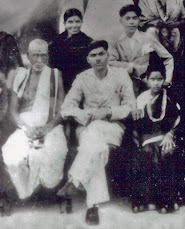When I speak of My awareness, I am conscious only of the contents of my awareness. Perhaps, I am aware of of awareness itself - but it itself at once becomes a content. This is the practical position with me. I am quite sure there are some persons who are aware of a featureless awareness, and even content to remain in that featureless Brahman. This is not possible for me; and what is not possible for me is useless for me, and the academic question whether there is a featureless awareness, whether it is good or bad have no operational consequence for me. What affects me are the contents of my awareness, and I must investigate and cultivate some control over them.
At this moment what am I aware of?
A catalogue of comments at any given moment, in as much detail as possible, is of great help. I can soon see that the comfort or discomfort I feel is traceable to a particular arrangement of contents; their mutual harmony or discord. A different arrangement might lead to comfort. I must try this out. After all, if I say that this house belongs to me, I must have some control over the contents.
For example, I am annoyed. My awareness consists of:
1. The memory of words someone uttered,
2. The significance of ‘insult’ I attach or learnt to attach to these words,
3. The memories of the good I have done the person and his ungratefulness reinforcing the annoyance,
4. The channels through which my annoyance is expressing itself,
5. Possibly the image of the retaliatory words I intend uttering or acts contemplated etc. - all reinforcing one another; and the whole leading to a most discordant household in the precincts of My Awareness, My very own territory.
If I am to be the master of my awareness, I become aware of the need to rearrange the contents. An ugly room can be improved by any one of the three or more methods:
- By throwing out the ugly bits,
- By finding new uses for them,
- By enlarging the room or the number of its contents, so as to ventilate and dilute the smothering contents,
- By introducing beneficial and harmonious contents, and so on.
In the above instance: I can counteract the feeling of hurt caused by the person by recalling the number of occasions when the person has been good to me or at least to someone else; by recalling the number of good things that have happened to me during that day, so that this hurt loses its primacy in the enlarged background of the goodness of man or god or life, and so on. If the ownership of the territory of awareness is accepted, the responsibility of beautifying it follows, and the search for methodical mastery follows, instead of bemoaning about fates and gods.











